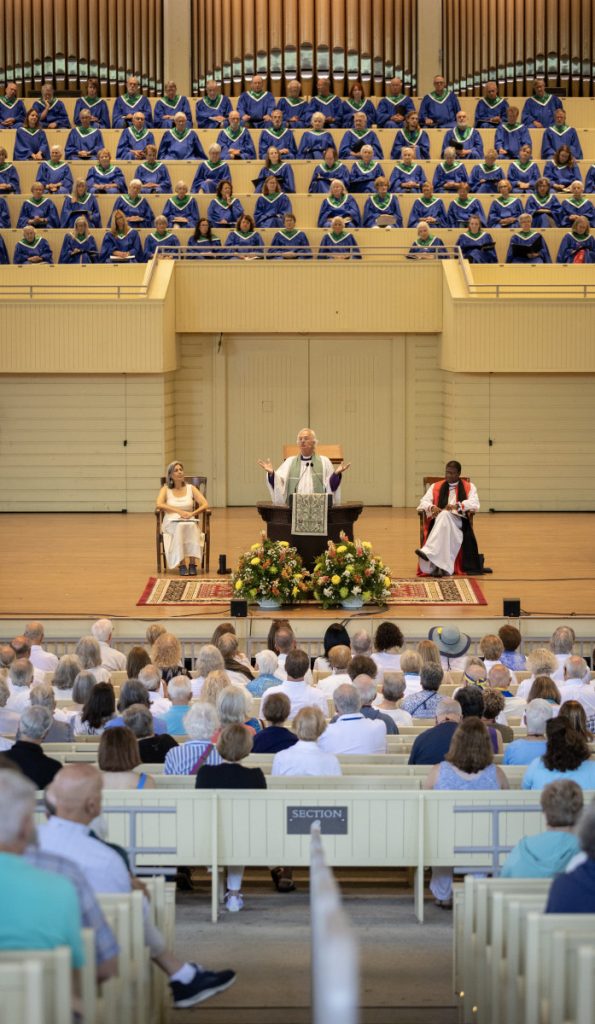
Column by Mary Lee Talbot
“Moses is my man,” said the Very Rev. Samuel G. Candler. “He took people places even when they did not want to go, even when they wanted to turn back. Moses is the reason for the title of this sermon, ‘God is not a Fundamentalist.’ ” The text for the sermon was Exodus 3:1-6.
Preaching at the 9:15 a.m. Tuesday morning worship service in the Amphitheater, Candler began his sermon singing, “Go down Moses, way down in Egypt land. Tell old Pharaoh, to let my people go.” Then he sang a line from Leonard Cohen’s song “Who by Fire” — “Who shall I say is calling?”
Candler told the congregation: “We live among fundamentalists and they are not just Biblical conservatives, there are liberal fundamentalists. I define a fundamentalist as someone unable or unwilling to change their mind. We all have some bit of fundamentalism in us. God is not a fundamentalist.”
In the story of Moses and the burning bush, Candler said Moses was practicing being “slow.” He stopped to study a bush on fire, and when he was being still, he noticed something. Anyone could see that the bush was on fire — but it took time to see that the bush was burning, but not being consumed. “Take time and God will appear.”
God identified himself as the God of Moses’ father and of Abraham, Isaac and Jacob.
“Moses thought, ‘Those are my people,’ ” Candler said. “If we want to find God, we will listen to stories of our families. God is present in the stories of our families. God identified with Moses first by recalling the past, recalling tradition.”
In the Judeo-Christian tradition, the literature of the Bible is family stories. They vary wildly, but the Bible, Candler said, is not a book of law or directions for living, but family history and the stories are about lots of conversations.
“It is like at Thanksgiving and your uncle tells a story and then your aunt says, ‘No, that is not the way it happened.’ In Genesis 1, the story of creation is told one way and in Genesis 2 it is told another way. The story of David is told one way in First and Second Kings and a different way in First and Second Chronicles.”
He continued, “Maybe Jesus, at night, told the disciples, ‘When I die, I don’t want four versions of the same story,’ but there are. The Bible keeps all of them. Some of the stories interrupt and correct each other and all of them can be holy.”
The world needs healthy parishes. A healthy parish is not just a political party, a social club, a therapy group or a school; not a video or a performance — “as good as some of them are,” Candler said. “A healthy parish life is participation in the life of the holy faith, of God above, God within us and God within others. We need a faithful community, not just a video because nothing satisfies like a healthy community.”
Moses decided that people would not follow him if he just reminded them that they were descended from Abraham, Isaac and Jacob. Moses asked God for God’s name. God answered, “I am who I am.” Yahweh can mean “I am who I am” or “I am becoming who I am becoming.”
“To become indicates a willingness to change, maybe even change your mind,” Candler said. “God changes and does not change.”
In Exodus 32, Moses was delayed in his meeting with God on Mount Sinai and the people made the Golden Calf, a fabricated idol. God was furious and told Moses that he would annihilate the people and start a new nation with Moses.
“What is more astounding than God abandoning the people, is Moses arguing with God,” said Candler. “Moses out-argued God and got Yahweh to change his mind. ‘Go down Moses, tell old Yahweh, let my people go.’ ”
In the King James translation of the Bible, it says God repented the possibility of destroying the people. The Greek word, said Candler, is “metanoia,” “meta” meaning change and “noia” meaning mind.
“We think it is theoretically impossible for God to change or repent, but God is not a fundamentalist, and the Bible is not a fundamentalist document,” Chandler told the congregation. “Stories of holy change are part of the tradition.”
He continued, “Have you ever tried to get someone to change their mind? The best way is to change your own mind. That is what Yahweh did.”
Candler asked the congregation if they knew how to fly a kite. What allows it to stay aloft? It is the string that is fixed to the ground.
“That is what tradition is,” he said. “Stories are the strings held to the ground that allow us to fly.”
“Spirit, come in wind! Spirit, come in flame! Come in wind, come in flame, tell again the story,” he sang, recalling the chorus from the morning anthem, “Spirit, Come.” Tradition, Candler said, “teaches us to change our minds gracefully and the world needs good traditions.
The Rev. Luke Fodor, vicar of the Episcopal Chapel of the Good Shepherd at Chautauqua, presided. Isabel Packevicz, student minister for the Department of Religion at Chautauqua, read the scripture. The prelude was “Rhosymedre,” by Ralph Vaughn Williams, played by Joshua Stafford, director of sacred music and Jared Jacobsen Chair for the Organist, on the Massey Memorial Organ. The anthem, sung by the Motet Choir under the direction of Stafford and accompanied by Nicholas Stigall, organ scholar, was “Spirit, Come,” by Evelyn R. Larter. The postlude was “Personet hodie,” by Pamela Decker. Support for this week’s chaplaincy and preaching is provided by the Samuel M. and Mary E. Hazlett Memorial Fund.




